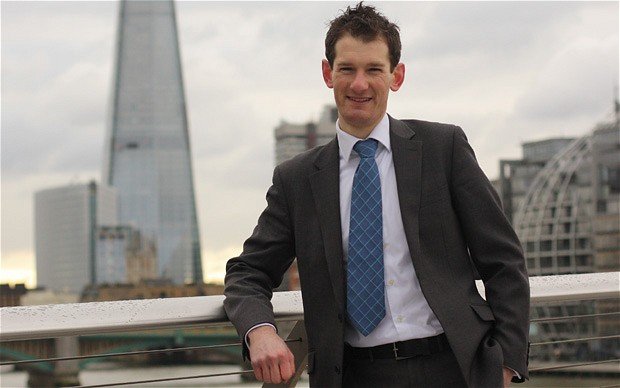Max Kirby wins HJI-Reed youth unemployment essay prize
Judges were impressed by Max Kirby's optimistic approach to tackling youth unemployment. Louisa Peacock interviews the winner of the HJI-Reed £10,000 cash prize.

Max Kirby, a former Lehman Brothers banker, has won £10,000 in cash as part of the HJI-Reed essay competition, sponsored by the Telegraph. Photo: Louisa Peacock
Perhaps it is a sign that at 26 years old, Max Kirby is the same age as when Sir Alec Reed founded his eponymous recruitment agency. The proud winner of Sir Alec’s first ever national essay prize – bagging himself £10,000 in cash – is contemplating starting a business with the money to help young people kick-start their careers.
“I wouldn’t want to set up in competition with the Reed empire,” he jokes. “But I think it’s a space that, despite many great organisations that work in it – whether they’re schools, charities, recruiters or employers – there’s still scope for innovation, otherwise we wouldn’t have 2.5m unemployed and employers saying we can’t find the skills we need.”
Starting his own company with his prize money is just one option for the unemployed Oxbridge graduate; he tells me he could equally be happy working for someone else.
A former Lehman Brothers banker, working in the City for two years before he chose to leave, Kirby is unsure about whether he’d go back to the City or pursue a more entrepreneurial path.
“It depends on where the opportunities are. For me the interesting question is, what am I going to do and am I going to love doing it?”
Related Articles
The winning essay: How to solve youth unemployment 07 Feb 2013
Britain has to tap the talent of young people 07 Feb 2013
The runners up: How to solve youth unemployment 07 Feb 2013
It is from this positive standpoint that Kirby impressed judges when he wrote his winning essay. The competition, launched last year by the Henry Jackson Initiative and Sir Alec, in collaboration with Telegraph Media Group, invited anyone aged 18 or over to pen a
1,000-word essay on ways to cut youth unemployment, in return for £10,000. The prize received 650 entries from academics, industry experts and job hunters, with varying insight and suggestions on how to tackle youth joblessness, which is currently around the 20pc mark in Britain.
According to Charlie Mayfield, chairman of John Lewis and one of the judges for the prize, Kirby’s essay stood out because he tackled the issue “not from a position of gloom, but actually of optimism and ambition”.
In his essay, Kirby writes: “We must adopt the right mindset: positive in outlook and global in ambition. For optimism stems not from denying change, but from recognising the possibilities it presents.
“The job-for-life has gone – but so has the tedium of career monogamy. International competition has intensified – but also opened up new opportunities abroad.”
Max Kirby said he may start a business to help young people kick-start their careers. Photo: Louisa Peacock
Kirby goes on to recognise that the problem of youth unemployment is not just recession-related, but a structural issue that has deep roots.
He suggested a “radical” overhaul of education, according to Mr Mayfield, to make it better-aligned to young people’s needs, and challenged the Government to scrap National Insurance payments for firms taking on young people. “If we want to boost employment, there must be smarter ways to raise revenue than by taxing jobs,” Kirby writes.
Describing why he entered the HJI-Reed prize, Kirby says: “To me, reducing youth unemployment is really about how do we ensure young people are fulfilling their potential, doing things that are meaningful to them.
“My essay isn’t just based on hard facts, it’s a combination of things I’ve always been interested in. Part of what I talk about is leadership; the idea of helping people by example, getting your hands dirty, is something that resonates with me.”
The HJI-Reed prize named Klara Kubiak and Sam Larcombe as runners up.
Read all three essays in full online at telegraph.co.uk/essay


 Votes : 0
Votes : 0









